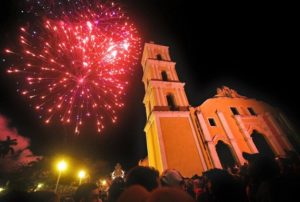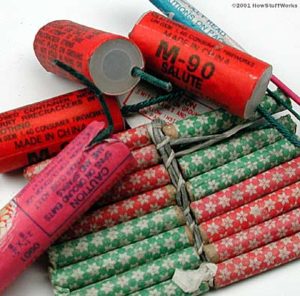CUBAN POPULAR PHRASES: “AS A ONE DOLLAR FIRECRACKER” (COMO UN VOLADOR DE A PESO).
“As a Firecracker of one Dollar” was a phrase that coined the Cubans of yesteryear. Just as flying rockets brighten the night, so do the sparkling minds of Cubans to create popular phrases.
Fireworks make their appearance in Europe, in Italy in the late fourteenth century, as a typically craft activity, which can hardly be mechanized without losing some of its most outstanding virtues. Florence seems to have been the center of this event, which saw a great boom during the sixteenth century, with fireworks displays frequently offered at civic or religious festivals and, above all, the day of St. Peter and St. Paul.
Pyrotechnics, as we know it today, is born with the discovery of black powder, and it is produced, according to Chinese documentation, in the 9th century AD under the Thang dynasty by one or more unknown alchemists.
The flying rocket is undoubtedly the oldest piece of aerial fire, witnessed in China as early as the twelfth century of our era, and the dimensions of the cartridge (without the cane or rudder) can vary from about 6 by 40 mm up to 25 by 200.
It is said that when George Washington was sworn in as the first president of the United States in the distant April 1789, all the bells rang with joy and joy, and the city was lit with fireworks in the night.
In Cuba, as in other Latin countries pyrotechnics also arrived very early and although there are no well-founded notes on the subject at the Christmas parties and religious and patriotic celebrations of yesteryear fireworks were reasons of singular interest.
In Jaruco, a city on the outskirts of Havana, Porfirio Hernández, nicknamed “the pilot”, who became famous for his bitter street debates about baseball, fired one of those thunderous devices when his team Almendares wins the game.
The picaresque creole was in charge of introducing to the speech of men, women and children a locution related to the most sonorous and fast of the artifacts used and that in the decade of the 40 of the XX century had a cost of a weight in all the national territory.
The speed with which this explosive rises to the sky and its price of sale to the public in that time, they agreed and then, the phrase was born like a flying of to weight, to identify the fast movements of one or several people when walking.
FRASES POPULARES CUBANAS: “COMO UN VOLADOR DE A PESO”.
“Como un Volador de a Peso” fue una frase que acuñaron los cubanos de antaño. Asi como los cohetes voladores iluminan la noche también lo hacen con la chispeante mente de los cubanos para crear frases populares.
Los fuegos artificiales, hacen su aparición en Europa, en la Italia de fines del cuatrocientos, como una actividad típicamente artesanal, que difícilmente podrá ser mecanizada sin perder algunas de sus virtudes más sobresalientes. Florencia parece haber sido el centro de este suceso, que conoció un gran auge durante el siglo XVI, con espectáculos de fuegos artificiales ofrecidos frecuentemente en fiestas cívicas o religiosas y, sobre todo, el día de San Pedro y San Pablo.
La pirotecnia tal y como hoy la entendemos nace con el descubrimiento de la pólvora negra y éste se produce, según documentación en China, en el siglo IX de nuestra era, bajo la dinastía Thang, por uno o varios alquimistas desconocidos.
El cohete volador, es sin duda la pieza más antigua de fuego aéreo, atestiguada en China ya en el siglo XII de nuestra era, y las dimensiones del cartucho (sin la cana o timón) pueden variar extraordinariamente, desde unos 6 por 40 mm hasta 25 por 200.
Se dice que cuando George Washington fue juramentado como el primer presidente de Estados Unidos en la lejana fecha de abril de 1789, todas las campanas repicaron de júbilo y alegría, y la ciudad estaba iluminada con fuegos artificiales en la noche.
En Cuba como en otros países latinos la pirotecnia llegó también muy temprano y aunque no existen apuntes bien fundamentados al respecto en las fiesta navideñas y celebraciones religiosa y patrióticas de antaño los fuegos artificiales constituian motivos de singular interés.
En Jaruco, una ciudad ubicada en las afueras de La Habana, Porfirio Hernández, alias “el piloto”, que cobró fama por sus enconados debates callejeros sobre béisbol, disparaba uno de aquellos estruendosos dispositivos cuando su equipo Almendares gana el juego.
La picaresca criolla se encargó de introducir al habla de hombres, mujeres y niños una locución relacionada con el más sonoro y rápido de los artefactos empleados y que en la década del 40 del siglo XX tenía un costo de un peso en todo el territorio nacional.
La velocidad con que este explosivo se eleva al cielo y su precio de venta al público en aquella época, coincidieron y entonces, nació la frase como un volador de a peso, para identificar los rápidos movimientos de alguna o varias personas al andar.
Agencies/Arrajatabla/Alberto Denis/Internet Photos/ Arnoldo Varona/ TheCubanHistory.com
THE CUBAN HISTORY, HOLLYWOOD.








